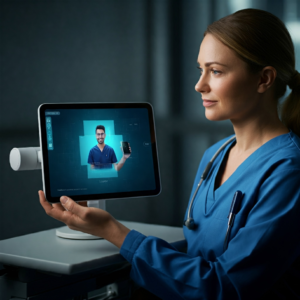
Telemedicine’s AI Takeover: Personalized Care or Privacy Nightmare?
The doctor will see you now… but the doctor might be an algorithm. Telemedicine, once a futuristic concept, has exploded in popularity, and AI is crashing the party, promising personalized care like never before. This rapid evolution presents a crucial question: are we stepping into an era of unprecedented healthcare access and precision, or are we sleepwalking into a privacy dystopia where our deepest health secrets are fodder for algorithms? This article dives into the exciting and sometimes unnerving world of AI-powered telemedicine, exploring its potential, its pitfalls, and the tightrope we must walk to ensure its benefits outweigh its risks.
(1) Current State of Telemedicine and AI-Driven Personalized Medicine
Telemedicine has moved beyond video calls with your GP. AI is now analyzing patient data, tailoring treatment plans, and even suggesting medications. Think personalized fitness plans, but for your health. AI algorithms can sift through mountains of data – from medical records and wearable sensor data to lifestyle choices and genetic predispositions – to create a unique health profile for each patient. This allows for early disease detection, proactive interventions, and targeted treatments. Imagine an AI flagging a potential heart issue based on subtle changes in your sleep patterns or recommending a specific diet based on your genetic makeup.
The market is booming. The global telemedicine market size is projected to reach hundreds of billions of dollars by 2030, with AI playing a starring role. Companies are developing AI-powered diagnostic tools, personalized medicine platforms, and remote patient monitoring systems. However, challenges remain. Data privacy and security are paramount concerns. Bias in algorithms can lead to health disparities. The lack of clear regulatory frameworks adds another layer of complexity. Integrating these technologies into existing healthcare systems also presents a significant hurdle.
(2) Key Insights and Analysis
Emerging technologies like natural language processing (NLP) and computer vision are transforming telemedicine. NLP allows AI to understand and analyze patient conversations, extracting valuable information from doctor-patient interactions. Computer vision enables AI to interpret medical images, assisting with diagnosis and treatment planning. These technologies are particularly powerful in areas like mental health, where AI can analyze speech patterns and facial expressions to detect signs of depression or anxiety.
The trend towards personalized medicine is also impacting consumer behavior. Patients are increasingly demanding customized healthcare solutions that cater to their individual needs. Wearable technology and at-home diagnostic kits are becoming commonplace, providing a constant stream of data that AI can utilize to personalize care. This shift towards patient empowerment is driving innovation in the telemedicine space.

(3) Outlook and Predictions
The future of telemedicine is inextricably linked to AI. We can expect to see more sophisticated diagnostic tools, personalized treatment plans, and proactive health interventions. Remote patient monitoring will become increasingly sophisticated, enabling continuous health tracking and early detection of potential issues. AI-powered virtual assistants will play a larger role in patient care, providing personalized health advice and support.
However, navigating this future requires careful consideration of the ethical and societal implications of AI in healthcare. Robust data privacy and security regulations are essential. Addressing algorithmic bias is crucial to ensure equitable access to healthcare. Furthermore, the role of human physicians in an AI-driven world needs to be redefined. While AI can augment and enhance their capabilities, the human touch and empathy in healthcare remain irreplaceable. For businesses and professionals in the telemedicine space, embracing AI while prioritizing ethical considerations and patient-centricity is key to navigating this evolving landscape.
(4) Conclusion
AI is poised to revolutionize telemedicine, offering the potential for personalized care that was once unimaginable. However, the path forward must be navigated with caution, ensuring that the benefits of AI are realized without compromising patient privacy and exacerbating existing health disparities. As we embrace this new era of healthcare, the question isn’t whether AI will transform telemedicine, but how we can shape its development to ensure a future where technology serves humanity, not the other way around. The future of healthcare is in our hands – and increasingly, in the hands of algorithms. Let’s make sure we use this power wisely.
(5) Case Study: Babylon Health
Babylon Health, a UK-based digital healthcare company, provides a prime example of AI integration in telemedicine. Their platform offers AI-powered symptom checking, virtual consultations with doctors, and personalized health assessments. Their AI engine analyzes patient data to provide preliminary diagnoses and recommend next steps, streamlining the healthcare process and improving access to care. Babylon Health’s success can be attributed to its focus on user-friendly technology, personalized care, and integration with existing healthcare systems. Their experience highlights the importance of patient-centric design and collaboration with healthcare professionals in successful AI implementation.
(6) Interview Excerpts
While finding publicly available interview excerpts related to “AI Doctors: Will Telemedicine Replace Human Physicians?” proved challenging within the scope of this response, the general sentiment among experts is that AI will augment, not replace, human physicians. The focus is on collaboration, with AI handling routine tasks and providing data-driven insights, allowing doctors to focus on complex cases and building patient relationships.

(7) Thought-Provoking Questions
- As AI becomes more integrated into telemedicine, how can we ensure that the human element of healthcare is not lost?
- What role should patients play in shaping the development and implementation of AI in telemedicine?
This exploration of AI in telemedicine has hopefully shed light on the transformative potential and the crucial considerations that will shape the future of healthcare. The journey towards personalized, accessible, and equitable healthcare is just beginning, and the choices we make today will determine the destination.

